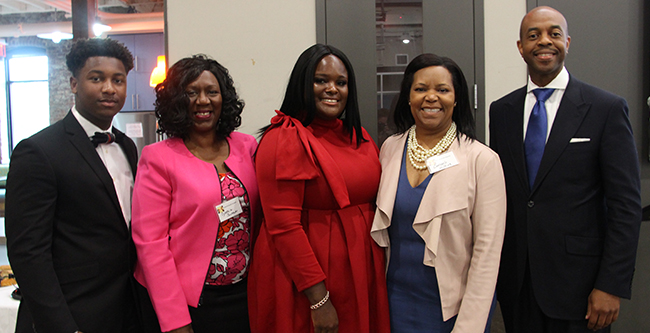
Photo by Matt Schorr
Pictured from left to right are Jordan Owens; Nashville Health Disparities Coalition Co-Chair Cynthia Jackson, PhD; Sierra Utley; Meharry-Vanderbilt Alliance Executive Director Consuelo H. Wilkins, MD, MSCI; and Rep. Rev. Harold M. Love, Jr., PhD at the Faith & Health Summit.
NASHVILLE, Tenn. Positive youth development, community resources, youth violence prevention, root causes and resilience – just a few key topics at Saturday’s Faith & Health Summit: Congregations and Youth Resilience.
For the second year in a row, the Nashville Health Disparities Coalition’s (NHDC) Faith and Health Collaborative and the Meharry-Vanderbilt Alliance sought to convene the faith based community to support health, well-being and health equity in Nashville.
Shared experiences
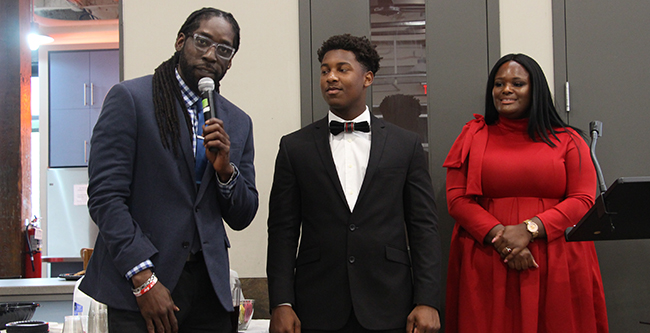
Photo by Elisa Friedman, MS
Emmanuel Ehiemua (left) served as the Faith & Health Summit moderator, while Jordan Owens (middle) and Sierra Utley (right) emceed.
Faith-based leaders, health researchers, community-based organizations and youth braved the rain on May 5, 2018, to gather at the Oasis Center, a community center that offers support to youth and families, for the second annual Faith & Health Summit.
Local members of the faith-based community and youth shared personal experiences, opinions and efforts to address the root causes of youth violence and – more importantly – how to support the movement of positive development and build resilience in Nashville youth. Many highlighted the need for true awareness, support and communication with youth.
‘Greatness takes work’
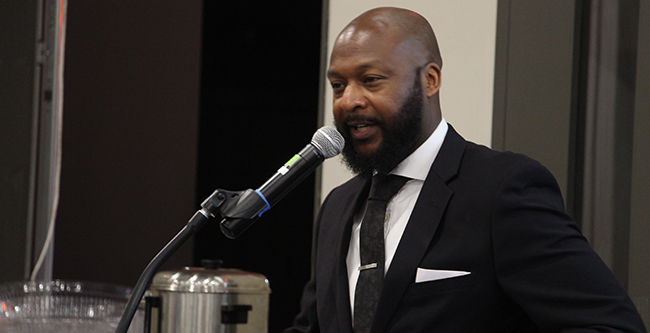
Photo by Matt Schorr
The Rev. James C. Turner II, M.Div. tells attendees that the Faith & Health Summitt's goals for youth are long-term ones.
The Rev. James C. Turner II, M.Div. of New Hope Missionary Baptist Church said their efforts most likely wouldn’t show immediate results. Change, he said, takes time.
“Greatness takes work,” he added.
Likewise, he urged the youth in attendance not to look for shortcuts in life and to take care who they brought into their lives. “Who you hang around with will determine your future,” he noted.
Engaging the voices of youth
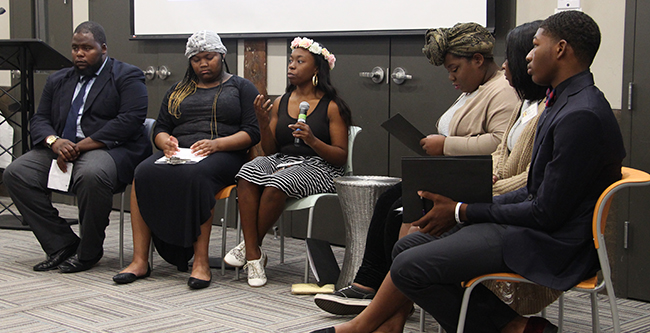
Photo by Matt Schorr
The Youth Panel discusses the current needs of today's youth in order to thrive.
The featured Youth Panel, which consisted of youth from the Oasis Center – Travonn Thompson, Semari Murphy, Alexis Kershaw, Joziyane Ndagijimana, Tamya Hall and Irving Brown – all agreed that, in order for youth to thrive, they needed a supportive environment.
“One reason teens go down the wrong path,” Alexis said, “they’re looking for a sense of family.”
She said parents were a child’s first role models and communication between them was vital.
Trayvon, who serves as Youth Pastor for Mt. Carmel Baptist Church, agreed, adding, “Young people need to know somebody actually cares about them.”
He mentioned the efforts of Rocket Town, a faith-based outreach facility that works to improve the lives of Nashville youth. He believed that work, and any other youth outreach work, was something all congregations and organizations should be able to get behind.
“We should all be able to come together under one God,” he said.
Facing the problem
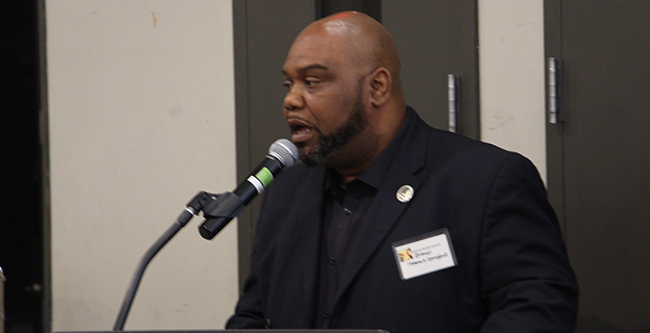
Photo by Matt Schorr
Bishop Marcus Campbell talks about his own traumatic childhood and his efforts to keep today's teens from making the same mistakes he did.
Bishop Marcus Campbell of Mt. Carmel Baptist Church described his own childhood trauma, and how it led him to a life of crime and, ultimately, prison.
Violence, anger and trauma were a big part of his youth, the former gang member explained. As a child, he witnessed his mother suffering violent abuse at the hands of his father.
His mentoring program – Gentleman And Not Gangsters (GANG) – is an effort to prevent today’s youth from making the same mistakes.
“I think big, I dream big, I believe big,” he said. “If you can change a mind, you can change a crime.”
Faith-Based Health Equity Awards
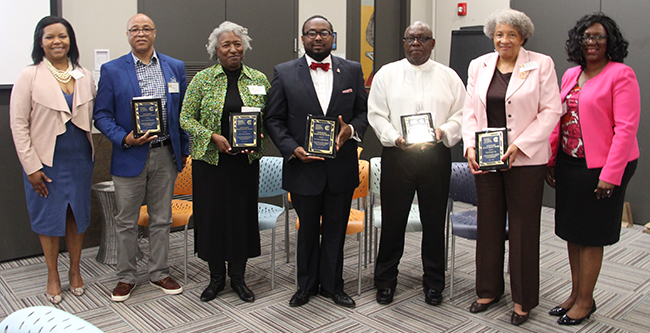
Photo by Matt Schorr
Rock United Ministries; New Season Church; St. James AME Church; Fath, Hope & Love Fellowship; and Faith Church, Inc. received this year's Faith-Based Health Equity Awards.
The MVA Executive Director Consuelo H. Wilkins, MD, MSCI and the NHDC Co-Chair Cynthia Jackson, PhD, presented the Faith-Based Health Equity Awards to five faith-based organizations, recognizing their efforts to improve the health and wellbeing of their congregants and the community, particularly efforts contributing to the well-being of youth. The awardees were:
- Faith Church, Inc.
Pastor Cora Alston - Faith, Hope & Love Fellowship
Pastor John J. Finn - New Season Church
Pastor Dwayne Lewis - Rock United Ministries
Pastor Samuel Orr - St. James AME Church
Pastor Omaran Lee
“Health equity is achieved when every person has the opportunity to attain his or her full potential, and no socially determined disadvantages exist,” Wilkins commented.
Leading the way
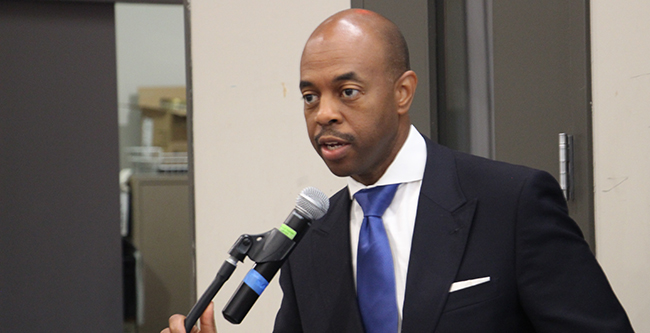
Photo by Matt Schorr
Rep. Rev. Harold M. Love, Jr., PhD says the Faith & Health Summitt is working toward a better tomorrow.
Rep. Rev. Harold M. Love, Jr., PhD – pastor of Lee Chapel AME Church, State Representative, and a 2018 Mayoral Candidate for Nashville, told attendees that efforts like the Faith & Health Summit were working toward more than just improving the community. They were working toward a brighter future.
“It’s not just about our city today, it’s about the city our children and our grandchildren will inherit,” he said. “One day, I envision no more breaking news stories about active shooters in malls, no more breaking news about a student shooting another student because they insulted his mother.”
Faith-based institutions, he believed, would have to lead the way.
Call to action
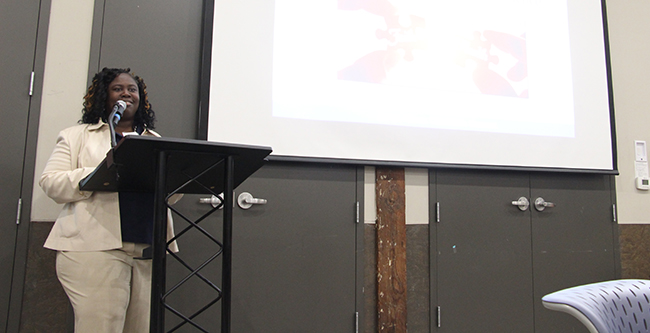
Photo by Matt Schorr
Juvenile Court of Metropolitan Nashville and Davidson County Judge Sheila D. Calloway calls for compassion and understanding for those in need.
Juvenile Court of Metropolitan Nashville and Davidson County Judge Sheila D. Calloway urged everyone to offer compassion and support to those who need it.
“We have to be the ones who say, ‘No, that’s not a bad kid, that’s a kid who’s made bad mistakes,’” she said. “We can do more as a community.”
Vendors
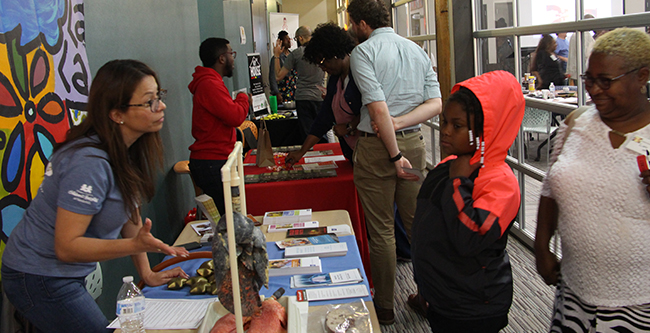
Photo by Matt Schorr
During the Summit, Vendors discussed ways to promote and advance community health. Here, Angelica Deaton of the Vanderbilt-Ingram Cancer Center exhibits a cancerous lung to attendees.
This year, 12 vendors attended the Faith & Health Summit to promote community health and resilience.
- Gideon’s Army
- Metro Action Commission
- Mayor’s Office of Neighborhoods: Opportunity NOW
- Mental Health America
- Salvation Army
- Youth Villages
- Breast Cancer Awareness – Echoes of Hope, Inc.
- Nashville Cares
- Congregational Health and Education Network
- ChurchHealth
- Vanderbilt-Ingram Cancer Center
- GetCovered Tennessee
About the Nashville Health Disparities Coalition
NHDC meetings are held every third Thursday of the month at Matthew Walker Comprehensive Health Center. For more than 25 years, the NHDC has worked tirelessly to empower community members in priority population groups to seek better health, help change local healthcare practices, and mobilize communities to implement evidence-based public health programs to reduce health disparities across a broad range of conditions.
The Faith and Health Collaborative
If you are interested in joining the Faith and Health Collaborative, please contact Jacquelyn Favours at Jacquelyn.s.favours@meharry-vanderbilt.org or call (615) 963-2817.
About the Meharry-Vanderbilt Alliance
Founded in 1999, the Alliance bridges the institutions of Meharry Medical College and Vanderbilt University Medical Center. Its mission is to enrich learning and advance clinical research in three primary areas -- community engagement, interprofessional education and research -- by developing and supporting mutually beneficial partnerships between Meharry Medical College, Vanderbilt University Medical Center and the communities they serve. Through community engagement, the Alliance serves a large community of stakeholders including surrounding universities and colleges, community organizations, faith-based outlets and community health centers. Its interprofessional education enhances students' interdisciplinary understanding and improves patient outcomes through integrated care. The research conducted provides access to experienced grant writers and materials supporting the grant application process and facilitates grant-writing workshop.




